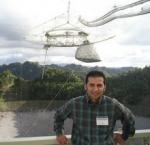 Salman Hameed
Salman HameedSalman Hameed of Hampshire College addressed the challenge of Islamic creationism in the December 12, 2008, issue of Science (322 [5908]: 1637-1638), warning (subscription required) that "although the last couple of decades have seen an increasing confrontation over the teaching of evolution in the United States, the next major battle over evolution is likely to take place in the Muslim world (i.e., predominantly Islamic countries, as well as in countries where there are large Muslim populations)." He added, "Relatively poor education standards, in combination with frequent misinformation about evolutionary ideas, make the Muslim world a fertile ground for rejection of the theory."
"We do not know much about general views about science in Muslim countries, let alone on the specific question of evolution," Hameed observed, although he discusses a recent survey asking, "Do you agree or disagree with Darwin’s theory of evolution?" He reported, "Only 16% of Indonesians, 14% of Pakistanis, 8% of Egyptians, 11% of Malaysians, and 22% of Turks agree that Darwin's theory is probably or most certainly true," he reports -- although 37% of Kazakhs agreed, which is comparable to the 40% of Americans who regard "Human beings, as we know them, developed from earlier species of animals" as probably or definitely true, as reported by Jon D. Miller, NCSE's Eugenie C. Scott, and Shinji Okamoto in 2006.
Similarly, not much is known about the state of evolution education in Muslim countries. The national academies of science of fourteen Muslim countries are signatories to the Inter-Academy Panel statement in support of evolution education (included in the third edition of Voices for Evolution), but what is actually presented about evolution in those classrooms is unclear. Citing work by Anila Asghar and Brian Alters (a member of NCSE's board of directors) surveying Pakistani textbooks and teachers as well as a recent study of Muslim university students studying in the Netherlands, Hameed tentatively suggested that in the Muslim world it is the idea of human evolution that elicits the most resistance.
Also contributing to the rejection of evolution in the Muslim world, unsurprisingly, is the view that evolution is tantamount to atheism. In a December 11, 2008, interview posted on New Scientist's website, Hameed commented, "If evolution is presented as a choice between evolution and religion, people are going to pick religion. No question." Similarly, in the Science article, he explained, "Evolutionary ideas about human origins may face serious obstacles, but a peaceful religious accommodation is also possible. However, efforts that link evolution with atheism will cut short the dialogue, and a vast majority of Muslims will reject evolution."
There is already a substantial creationist movement in the Muslim world, Hameed observed, writing in a December 12, 2008, essay posted on the Guardian's science blog that "the dominant voice shaping the evolution-creation debate in the Muslim world is that of Turkish creationist Adnan Oktar, who uses the pen name Harun Yahya." (For background, see Taner Edis's "Cloning Creationism in Turkey" published in Reports of the NCSE in 1999.) Both in his Guardian essay and in his Science article, Hameed urged the scientific community to take action: "Scientists, especially biologists, should write for newspapers and magazines read by a Muslim audience and seize back the initiative from creationists like Yahya."
